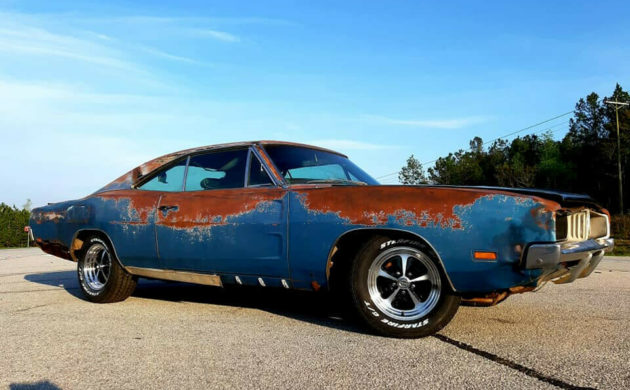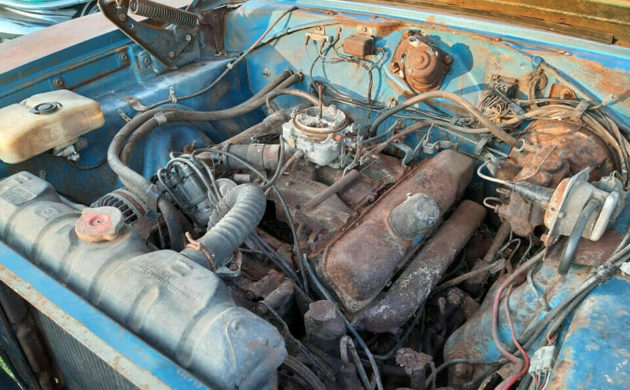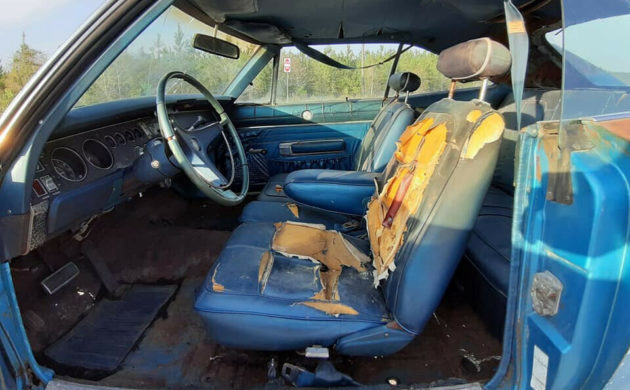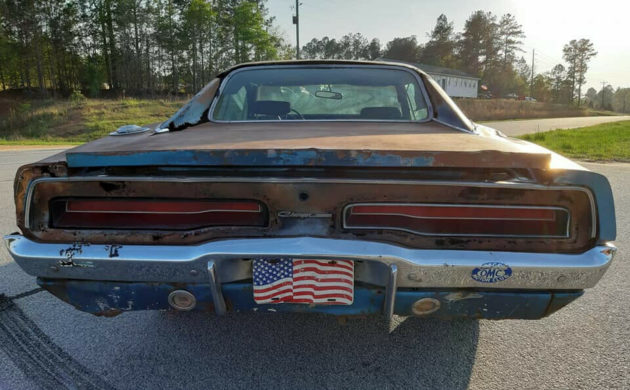This 1969 Dodge Charger is said to be a real barn find that has been rescued from long-term storage and still retains its numbers-matching drive train! It was last registered in 1986 and can now be found for sale here on eBay with an asking price just shy of $20,000. It obviously has some dents and dings and the B5 Blue paint has given way to patina, but it doesn’t look like the rust has eaten through much of the body. Located in Millen, Georgia, the ad says the wheels and tires you see in the photos don’t go with the car, but I guess everything is negotiable. Have a look at this nice Mopar project and let us know what you think.
As mentioned before, the drive train is the original numbers-matching set-up, which is a huge bonus for a project like this. Hopefully, the 383 cubic inch big-block V8 is rebuildable. The ad says it turns easy but doesn’t currently run and drive. It is mated to the factory torqueflite 727 transmission and has less than 70K original miles since new.
Obviously the driver’s seat upholstery looks a little rough. There are quite a few good pictures of the interior in the ad and it doesn’t look too bad overall, but the headliner, door panels, trim, and dash will all need attention along with the seats. This car features amenities like cruise control along with a defrost rear window, which might make it a bit more desirable.
The car does currently have a black hood installed, but the seller says they have the original blue hood although it has a bit of damage. There are also some “original parts in a box,” and the aftermarket supports these cars pretty well too for the parts that need to be replaced. There are quite a few notes regarding metal that needs to be addressed. Hopefully, the car isn’t too far gone for restoration. What do you think?







Take a look at the tail light panel, the edge of the trunk, the roof skin seam, the rear window, the rear fender, and the floorboards; this thing is pretty rotten. A valuable car to be sure, but there isn’t a panel on this one that doesn’t need to be touched, and, as a 383/auto car, it’s still valuable, but not so valuable that it makes financial sense to dump money into it. If you’re really good at body work and really
enjoy it, this could be for you.
So it’s not totally awful and it’s numbers matching. But it’s an non driving 383 with column shift auto that will need a huge investment of time, effort and money to ever turn an wheel. And who knows if the original engine can be fixed/rebuilt. Worse the crazy seller won’t include the new wheels and tires in his $20k asking. You’d have to be way crazier than him to offer anything remotely close to that.
Big ticket resto for sure…but I’m a save-the-mopars! guy.
Or…. You could take the 20K you’re going to spend to buy it and the 50K it will take to restore it (if you do the work yourself) and buy one you could drive today.
From the trim level and the valence you can see that this is a Charger 500 with a 383 2bbl. This was the highest trim level and I’m surprised that it didn’t have AC.
In 1969 the Charger 500 was an aerodynamic packager with flush mounted grill and rear window and shortened trunk lid used on the Daytona, which came out later in the year. There were only two engine choices, standard was the 440 magnum, optional was the 426 hemi. It wasn’t until 1970 that the 500 became a trim/appearance package.
Steve R
Interesting. I recall a classmate at DeVry from Michigan brought a 1968 B5 blue Coronet 500 to school in 1973. That car came with a 383 2bbl, four speed stick with a long shift lever, and a really nice interior and chrome trim package like this Charger once had.
It was nice until he wrecked it while delivering pizza.
Hard for me to imagine (not saying it was impossible) why someone would order a Charger with a 4 speed and a 2 barrel.
The S/E package was the top of the line trim in 1969
Please explain the new wheels on the ratty old car. Seems like all sorts of people are suddenly changing their minds about car restorations.
They aren’t changing their minds , this is a car flipper sale. Its probably one of two things – This car sat for a long time and the tires that were on it were likely flat and so dry rotted that they wouldn’t hold air , so the flipper took the wheels off a car he had , or he put the mags on the car to catch your eye and make the car look sharper than it actually is
Rust holes abound, sustained water intrusion into the interior, corroded dash/electronic components, rusty, rare options…….would have to be a self-skilled labor of love restoration. A time/money pit, anyway you look at it (IMO).
Ha ha ha ha, big block? B engine, not big block. Chevy-Ford term.
Why would you have parked this 34 years ago?
Mid 70’s, $60. dollar car. Rust gains in value over time.
6 engine choices, and this is third from bottom.
How do valve covers rust?
Movin on
After my father passed in 67, I eventually convinced my mother to buy one of these, a 69, also blue, even if it was only a 318, automatic. At least the speedometer went to 150..
Two years later, with around 30K on the clock, my ___hole uncle convinced her to trade it in (without my knowledge) for a 72 Coronet.
Sigh.
That reminds me of a similar story .Back in 1972 ,my fathers friend invited me to go to a local racetrack. I got picked up in his sons yellow 70 Boss 302 . I thought that was the coolest looking car ! A few months later he bought his friends blue 70 Boss 302 because the guy couldnt make the payments.For two years I got to go to the races in two cool cars until one Saturday in 1974 he showed up in a brand new 4 door Satellite .Apparently he traded both Mustangs in for it ! Going to the track was never the same after that
Tease in background. Viper
Total rot box, trashed interior, column shift auto and all for the bargain price of only $20k… Not likely!
And….gone. The thought of spending 20 grand on something like this Now is just ghastly to me. So does this mean my poor, sad, beat down mutual fund is going to be making a comeback?
Mutual funds work opposite of gasoline prices. Gas prices rocket up then slowly come down.
Mutual funds sink like a rock when the markets tank but take forever to return to pre-sink levels. That’s why I moved my money into a ratcheting index fund as soon as I passed 59 1/2. Talk to your money man about it.
This beauty ain’t gonna need gasoline for quite some time! But yes, I’m toast for now. But what else is new? I’ll be readjusting after this recovers (which it will ultimately).
It wasn’t necessarily sold for 20K.
“This listing was ended by the seller because the item is no longer available.”
That could mean anything.
Yes, a 383 is a big block. Mopar had a low deck (383, 400 and others) and raised deck (413, 426, 440) The basic block architecture is the same engine family. Do Ford and GM have the words “big block” copyrighted or something? So, is the 360 Mopar a small block or would you rather call it an LA series engine??
So, in your reasoning, is 383 a big or small block?
So you understand why B, RB are used. Plymouth had a 350. In your infinite wisdom, is the 350 big or small block?
Also, 2 completely different 318’s were used. They are not grouped together as small blocks.
Big or small, where is this decision made in cubic inches?
Well…it gets sticky because Chevy made a 400 out of the same block as the original 265, didn’t they? But the 348 and 409 were a physically larger block, and that block gave way to the 396/402/454 family.
Ford had the 221/260/289/302 engines, then the FE series that had a physically larger block.
Post-early-Hemi Mopars had the B series of 350/361/383/400 engines, while the 318 Poly was the A series motor until the 273/318/340/360 series came along, with a physically smaller and lighter block. The 413/426/440 were RB series motors, with a physically larger block than the B series.
As far as I know, this variety doesn’t exist in the Buick, Olds, and Pontiac models. You can easily swap a 455 into any of these pre-1980 cars.
But then, you folks already knew that, right?;)
Dont forget Mopar had another, a high block 383. This meant for fun, a high block 383 2 barrel intake will bolt rite onto a 440. There were 2 426 blocks. Wedge and Hemi.
These are the reasons Mopar never referred their engines as big or small block.
Also, the poly 318 type engine had some inch variables.
Also, the rear distributor Hemi had quite a few different inches.
Also, certain poly blocks will bolt on Hemi heads and intake.
That means, Hemis and A engines can interchange for a major appearance change, from small block look to Hemi, but still use the same block. This is why that term is irrelevant. That came from the public thru lack of knowledge.
Got more to do on my 61 Imperials. Later
Jesus christ. Unless that car is made of copper or brass that isn’t patina. Its RUST!